
|
 |

|
|---|
(During The Reefer Madness Era)
ANSLINGER'S GORE FILE PAGE

|
HOME OF THE WAR ON DRUGS HOW IT ALL STARTED IN MISSISSIPPI 1890 |
|---|---|

|
NEWSPAPER HEADLINES DURING THE REEFER MADNESS ERA |
(During The Reefer Madness Era)
Although Mississippi only had two official Gore File Cases, one of them has created such an air of mystery, that its true nature remains an enigma to this very day.
MISSISSIPPI BUST
Name: Herman S. Jernigan - Location: - Blue Mountain, Miss - Date: - April 28, 1936
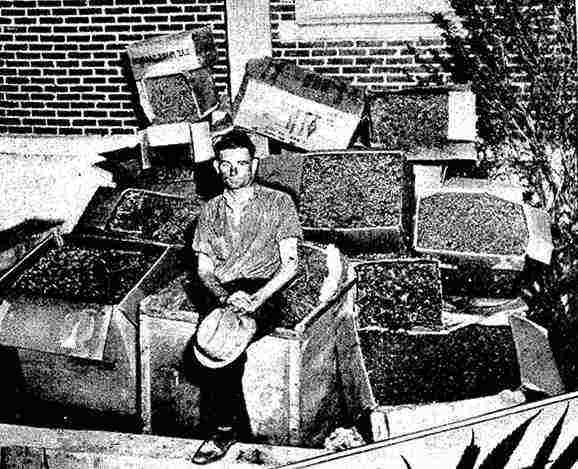
What the Narc’s were claiming
Blue Mountain. --During April 1936, on a farm 3 miles east of Blue Mountain, Miss., evidently used as a supply base for the marihuana traffic in a number of neighboring States in addition to Mississippi, Federal narcotic agents and State officers destroyed one of the biggest sources of supply in the South. Herman S. Jernigan, owner of the farm, was raising marihuana on a large scale and giving it the same careful attention that a wholesale farmer would give to the raising of cotton for market delivery. The raiding party confiscated 3,000 pounds of the growing marihuana, 300 pounds of seed, and 1,000 pounds of dried marihuana, the latter being contained in 10 large corrugated boxes which were concealed under hay in a barn. The area under cultivation was about 5 acres. ---The Traffic in Opium and other dangerous drug (1936)NEWSPAPER ACCOUNTS:
Marihuana having a value of $40,000 if sold as a filler for cigarettes was seized in Blue Mountain, Miss. The weed, when taken, was found parked in cardboard cartons ready for shipment to the makers of these illicit Cigarettes. The confiscated weed found at Blue Mountain weighed nearly one ton. At right is shown a close-up of the marihuana plant. --- New Orleans appeared to be the chief and most profitable market. Eleven persons arrested there for unlawful marihuana purchases acknowledged that their supplies had originated at- this farm. It was reported that school children were sold marihuana cigarettes from the same source. This was the first large seizure after enactment of the Mississippi uniform narcotic drug law on March 16, 1936. Jernigan was arrested and charged under this law and later released under a $1,500 bond. His queer actions were partly responsible for the raid on his farm. He said he had become addicted to marihuana 8 years ago. A brother about 14 years of age is also an addict ---Oakland Tribune (Newspaper) Oct. 11, 1936 “Don't be a MuggleHead”
RENO EVENING GAZETTE - Reno, Nevada
[S-April 28, 1936 pg. 16] “$100,000 Worth in One Dope Haul”
CHICAGO DEFENDER
[ ] - Oct 15, 1938 pg 1 - Mississippi Marijuana Farms Raided; 2 Tons of Weed Taken”
[See Reefer Madness Newspaper Index pamphlet for more references]
[Key-finder - Case#MS01]
MUSEUM COMMENTARY:
By implication the narcotics police (who had control of what the news media was told), made it seem as if Mr. Jernigan (the farm’s owner) was a much to be feared Big Time Drug Lord. A low life of the lowest form, who was well on his way to enslaving numerous high school students with his nefarious wares. And in all likelihood already had criminal gangs scouting out the near by high school playgrounds for this very purpose. --- Why had it not been for the quick thinking and work of the drug police; who knows how many murders would have been committed by young people under the drug’s deadly influence? The following article summarizes what the press was being told at the time.
BiloxiDailyHerald1936-04-15p1In other words, Mr. Jernigan was a BIG TIME DRUG LORD, who (through the tireless and careful work of detectives) had been brought to justice. But is this what actually happened? Were the above stories about Mr. Jernigan’s at all true? The answer seems to be a BIG RESOUNDING NO! And while the museum has not had a chance do a detailed investigation, by shear happenstance we were able to obtain documents from various archival libraries which clearly show that previous (long term) communications were held by Mr. Jernigan and Harry Anslinger himself. Communications which clearly show that both Mr. Anslinger as well as the state of Mississippi’s Attorney General were well aware that Mr. Jernigan intention to grow Medical Cannabis SOLELY for its Medical Purposes. And for sale solely to legitimate buyers.
RECORD SEIZURE OF MARIJUANA IS MADE
Ton and Half of Mexican Weed Found in Tippah County
May Be Cause of League of Nations Discussion.
New Orleans. April 15 —(AP)—J. Greeson, district supervisor of the Federal Narcotic Bureau here, today reported that federal agents working in conjunction with Mississippi authorities had seized a ton and a half of marijuana from a farm near Blue Mountain; Miss., and had arrested one man, the son of a well known Mississippi farmer.
Greeson said the seized Mexican weed, now outlawed in Mississippi by state law, had a bootleg sale estimated at between $25,000 and $30,000 and that the seizure was the largest of its kind ever made.
The case likely would be cited before the International Narcotic Committee of the League of Nations, he said, as traffic in the weed has become an international subject.
The officers arrested Herman Jernigan, 25. Greeson said young Jeraigan was accused of raising the product and was held under bond of $1,000.
He is to be prosecuted under the new Mississippi uniform narcotic act which became a law on March 16, 1936.
Greeson said his agents had kept the Jernigan farm under surveillance for some time but were powerless to raid it until the Mississippi law was enacted and became effective.
He said his agents had visited the farm up in northeast Mississippi several times and had posed as marijuana bootleggers and purchased quantities of marijuana.
Greeson said his agents had obtained evidence seeking to show that the weed had been sold to peddlers in Memphis, Little Rock, Jackson and Birmingham.
Greeson said the farm had been watched under instructions from Harry J. Anslinger, commissioner of the narcotic bureau in Washington, and that his agents, J . R. Stack and T. E. McQuire in cooperation with Lew Wallace, of Laurel, Miss,, secretary of the Mississippi State Board of Pharmacy and local Tippah County officers went to Blue Mountain this week and staged the raid on the farm.
Mr. Greeson said that the weed was stored in an outhouse where it was protected from the weather and covered with old blankets.
The following communications were located via the 'National Archives' (College Park, Md). Note, all web pictures here have been photo-shopped for quicker download times; and appear here in chronological order. Feel free to ask for copies of the originals.
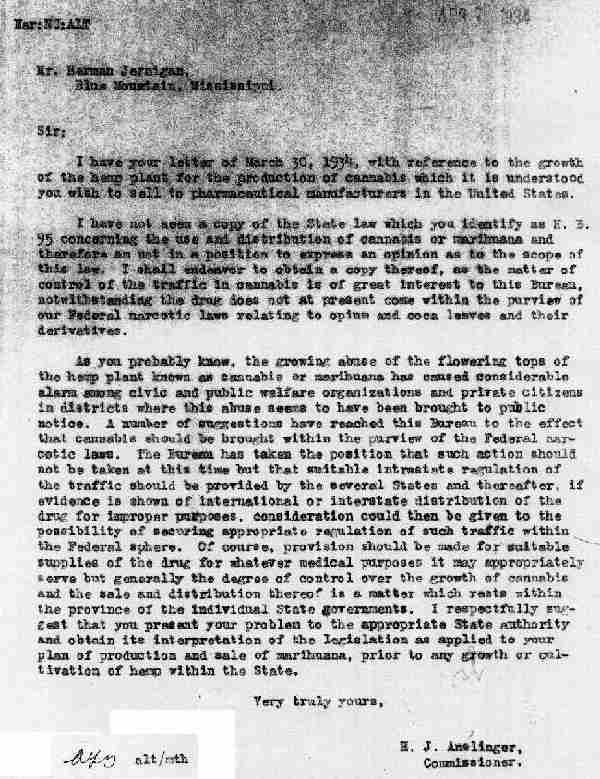
[April 07, 1934]
Mr. Herman Jernigan,
Blue Mountain, Mississippi
Sir:
I have your letter of march 30, 1934, with reference to the growth of the hemp plant for the production of cannabis which it is understood you wish to sell to pharmaceutical manufacturers in the United States.
I have not seen a copy of the State law which you identify as H.B. 95 concerning the use and distribution of cannabis or marihuana and therefore am not in a position to express an opinion as to the scope of this law. I shall endeavor to obtain a copy thereof, as the matter of control of the traffic in cannabis is of great interest to this Bureau, notwithstanding the drug does not at present come within the purview of our Federal narcotic law relating to opium and coca leaves and their derivatives.
As you probably know, the growing abuse of the flowering tops of the hemp plant known as cannabis or marihuana has caused considerable alarm among civic and public welfare organizations and private citizens in districts where this abuse seems to have been brought to public notice. A number of suggestions have reached this Bureau to the effect that cannabis should be brought within the purview of the Federal narcotic laws. The Bureau has taken the position that such action should not be taken at this time but that suitable intrastate regulation of the traffic should be provided by the several States and thereafter, if evidence is shown of international or interstate distribution of the drug for improper purposes, consideration could then be given to the possibility of securing appropriate regulation of such traffic within the Federal sphere. Of course, provision should be made for suitable supplies of the drug for whatever medical purposes it may appropriately serve but generally the degree of control over the growth of cannabis and the sale and distribution thereof is a matter which rests within the province of the individual State governments. I respectfully suggest that you present your problems to the appropriate State authority and obtain its interpretation of the legislation as applied to your plan of production and sale of marihuana, prior to any growth or cultivation of hemp within the State.
Very truly yours,
H.J. Anslinger,
Commissioner
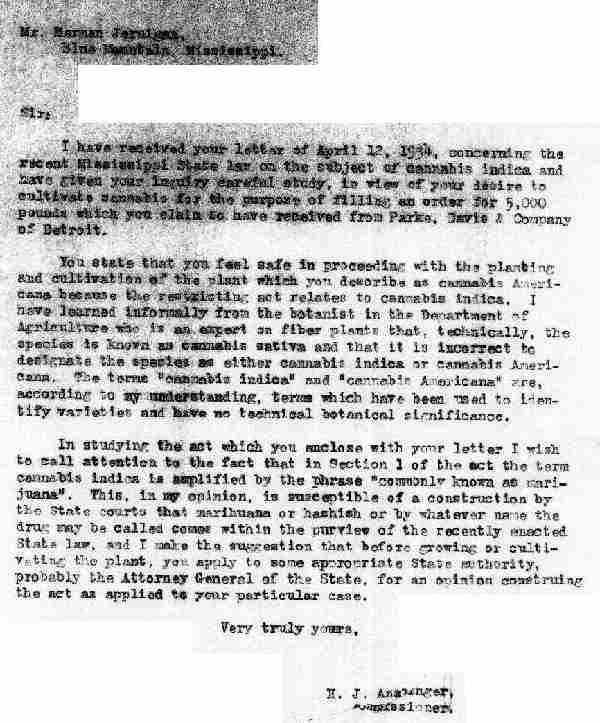
[April 30, 1934]
Mr. Herman Jeraigan,
Blue Mountain, Mississippi
Sir:
I have received your letter of April 12, 1934, concerning the recent Mississippi State law on the subject of cannabis indica and have given your inquiry careful study, in view of your desire to cultivate cannabis for the purpose of filling an order for 5,000 pounds which you claim to have received from Parke, Davis & Company of Detroit.
You state that you feel safe in proceeding with the planting and cultivation of this plant which you describe as cannabis Americana because the restricting act relates to cannabis indica. I have learned informally from the botanist in the Department of Agriculture who is an expert on fiber plants that, technically, the species is known as cannabis sativa and that it is incorrect to designate the species as either cannabis indica or cannabis Americana. The term “cannabis indica” and “cannabis Americana” are, according to my understanding, terms which have been used to identify varieties and have no technical botanical significance.
In studying the act which you enclose with your letter I wish to call attention to the fact that in Section 1 of the act the term cannabis indica is amplified by the phrase “commonly known as marijuana”. This, in my opinion, is susceptible of a construction by the State courts that marihuana or hashish or by whatever name the drug may be called comes within the purview of the recently enacted State law, and I make the suggestion that before growing or cultivation the plant, you apply to some appropriate State authority, probably the Attorney General of the State, for an opinion construing the act as applied to your particular case.
Very truly yours,
H.J. Anslinger
Commissioner.
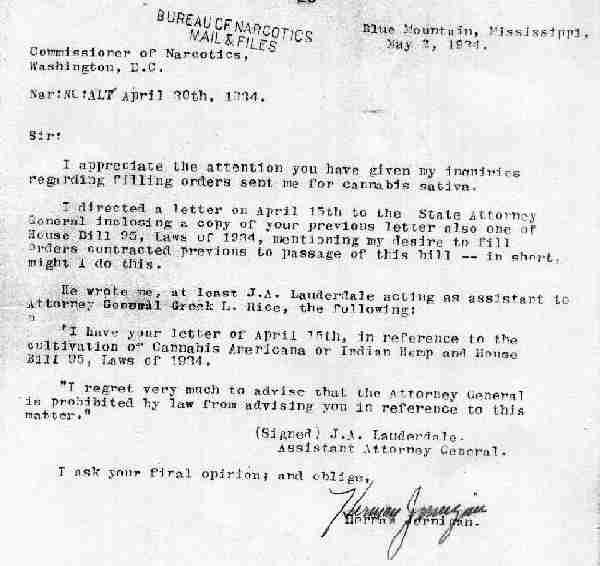
Commissioner of NarcoticsThus instead of great detective work on the part of either the Federal Bureau of Narcotics or the State of Mississippi, it turns out that Mr. Jernigan was simply a medical grower and had himself informed the narc's of his activities all along.
Washington, D.C.
Blue Mountain, Mississippi,
May 2, 1934
Sir:
I appreciate the attention you have given my inquiries regarding filling orders sent me for cannabis sativa.
I directed a letter on April 15th to the State Attorney General enclosing a copy of your previous letter also one of House Bill 95, Laws of 1934, mentioning my desire to fill orders contracted previous to passage of this bill -- in short, might I do this.
He wrote me, at least J.A. Lauderdale acting as assistant to Attorney General Greek L. Rice, the following:“I have your letter of April 15th, in reference to the cultivation of Cannabis Americana or Indian Hemp and House Bill 95, Laws of 1934.I ask your final opinion; and oblige,
“I regret very much to advise that the Attorney General is prohibited by law from advising you in reference to this matter.”
(Signed) J.A. Lauderdale
Assistant Attorney General
(signed) HERMAN JERNIGAN
AND THERE IS MORE . . . an editorial opinion:
Unfortunately the story does not end there, in fact it gets weirder and weirder as some aspects of the Jernigan story begin to take on the air of a conspiracy.
Recalling the plot of a old movie (The X-Files), which was a spin off of a television series of that name. It appears that one of the characters deliberately sacrificed (allowed himself to be killed) so that his fellow conspirators could continue on with their plot. In other words this person believed that the purpose of the conspiracy was well worth; ---even his own life. This point is brought up because (if the conspiracy angle is true), than it is all too possible that Mr. Jernigan himself may have been little more than a conspiracy goat (or fall guy) for his fellow conspirators. Let us begin by examining the following document:
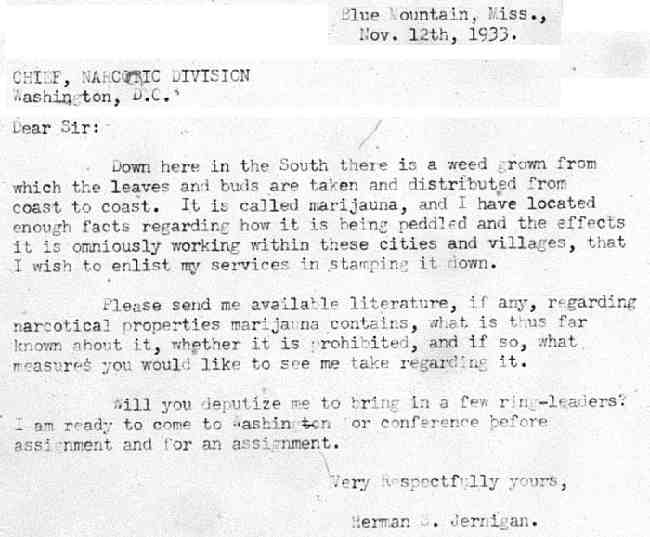
BOX 3 - File 4 - Correspondence, 1936 [PennState University – Harry Anslinger Collection]Note the date 1933, as well as the fact that Mr. Jernigan is (at this time) talking about how to STOP the Marihuana traffic. Just the mind-set of this individual makes it hard to believe that within just a few short years, he was going to become either a Medical Cannabis provider or worst yet (from his standpoint) a major Marihuana drug ringleader. A more likely occurrence being that he would/did get together with other like minded individuals to take the initiative into their own hands. Also, note that date again Nov 1933, that would place this letter as having been written less than five months before he decides to start growing marihuana himself. ---Humm!
Blue Mountain, Miss.,
Nov. 12th, 1933 -
CHIEF, NARCOTIC DIVISION
Washington, D.C.
Dear Sir:
Down here in the South there is a weed grown from which the leaves and buds are taken and distributed from coast to coast. It is called marijuana, and I have located enough facts regarding how it is being peddled and the effects it is ominously working within these cities and villages, that I wish to enlist my services in stamping it down.
Please send me available literature, if any, regarding narcotical properties marijauna(sic) contains, what is thus far known about it, whether it is prohibited, and if so, what measures you would like to see me take regarding it.
Will you deputize me to bring in a few ring-leaders? I am ready to come to Washington or conference before assignment and for an assignment.
Very Respectfully yours,
Herman S. Jernigan.
All one can say is that something smells rotten in Denmark here. And for emphases, let’s take a closer look at that Associated Press article previously shown. As published in the Biloxi Daily Herald (April 15, 1936) it quotes J. Greeson District Supervisor for the Federal Bureau of Narcotic’s (today known as the DEA) as stating that:
“Greeson said his agents had kept the Jernigan farm under surveillance for some time but were powerless to raid it until the Mississippi law was enacted and became effective. He said his agents had visited the farm up in northeast Mississippi several times and had posed as marijuana bootleggers and purchased quantities of marijuana. . . . Greeson said the farm had been watched under instructions from Harry J. Anslinger, commissioner of the narcotic bureau in Washington, and that his agents, . . . “And even goes on to state:
“Greeson said his agents had obtained evidence seeking to show that the weed had been sold to peddlers in Memphis, Little Rock, Jackson and Birmingham. . . . He said his agents had visited the farm up in northeast Mississippi several times and had posed as marijuana bootleggers and purchased quantities of marijuana.” . . .Humm! Something really does smell rotten in Denmark here. Apparently the Narc’s would have us believe that Mr. Jernigan’s (within a few short years, went from being an ardent anti-Drug crusader to a major big time drug lord. And we have even found part of (what appears to be) an 'internal Bureau of Narcotics' memo with reads as follows:
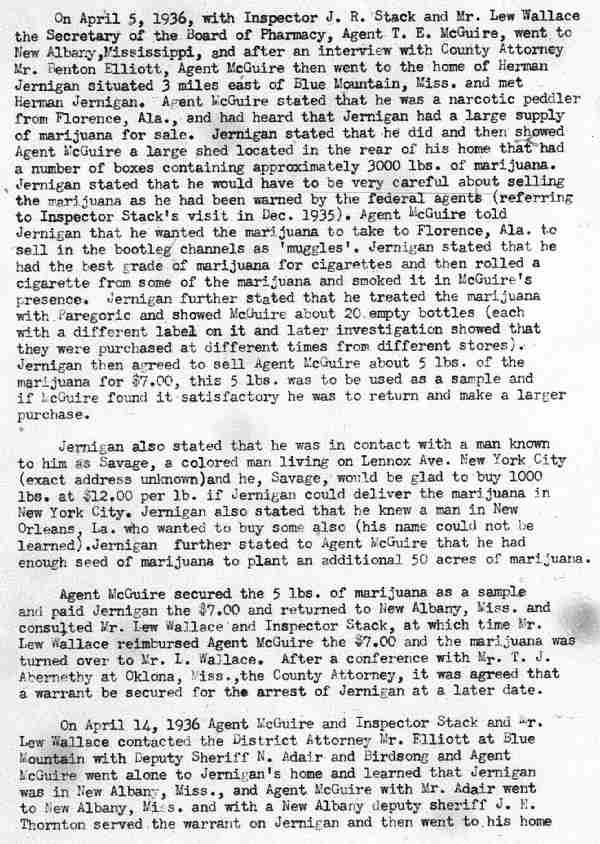
On April 5, 1936, with Inspector J.R. Stack and Mr. Lew Wallace the Secretary of the Board of Pharmacy, Agent T.E. McGuire, went to New Albany, Mississippi, and after an interview with County attorney Mr. Benton Elliott, Agent McGuire then went to the home of Herman Jernigan situated 3 miles east of Blue Mountain, Miss. and met Herman Jernigan. Agent McGuire stated that he was a narcotic peddler from Florence, Ala., and had heard that Jernigan had a large supply of marijuana for sale. Jernigan stated that he did and then showed Agent McGuire a large shed located in the rear of his home that had a number of boxes containing approximately 3000 lbs. of marijuana. Jernigan stated that he would have to be very careful about selling the marijuana as he had been warned by the federal agents (referring to Inspector Stack's visit in Dec. 1935). Agent McGuire told Jernigan that he wanted the marijuana to take to Florence, Ala. to sell in the bootleg channels as 'muggles'. Jernigan stated that he had the best grade of marijuana for cigarettes and then rolled a cigarette from some of the marijuana and smoked it in McGuire's presence. Jernigan further stated that he treated the marijuana with Paregoric and showed McGire about 20 empty bottles (each with a different label on it and later investigation showed that they were purchased at different times from different stores). Jernigan then agreed to sell Agent McGuire about 5 libs. of the marijuana for $7.00, this 5 lbs. was to be used as a sample and if McGuire found it satisfactory he was to return and make a larger purchase.Alright, irregardless of what the narc’s had to say, (and if you've looked over this website enough, you'll know that they lie a lot), there are some major problems with this whole story.
Jernigan also stated that he was in contact with a man known to him as Savage, a colored man living on Lennox Ave. New York City (exact address unknown) and he, Savage, would be glad to buy 1000 lbs. at $12.00 per lb. if Jernigan could deliver the marijuana in New York City. Jernigan also stated that he knew a man in New Orleans, La. who wanted to buy some also (his name could not be learned). Jernigan further stated to Agent McGuire that he had enough seed of marijuana to plant an additional 50 acres of marijuana.
Agent McGuire secured the 5 lbs. of marijuana as a sample and paid Jernigan the $7.00 and returned to New Albany, Miss. and consulted Mr. Lew Wallace and Inspector Stack, at which time Mr. Lew Wallace reimbursed Agent McGuire the $7.00 and the marijuana was turned over to Mr. L. Wallace. After a conference with Mr. T.J. Abernethy at Oklona, Miss., the County Attorney, it was agreed that a warrant be secured for the arrest of Jernigan at a later date.
On April 14, 1936 Agent McGuire and Inspector Stack and Mr. Lew Wallace contacted the District Attorney Mr. Elliott at Blue Mountain with Deputy Sheriff N. Adair and Birdsong and Agent McGuire went alone to Jernigan's home and learned that Jernigan was in new Alabny, Miss., and Agent McGuire with Mr. Adair went to New Albany, Miss. and with a New Albany deputy sheriff J.H. Thornton served the warrant on Jerigan and then went to his home . . (probably more) . .
MAJOR PROBLEM #1: - According to the narc’s Mr. Jernigan’s was selling a pound of Marijuana for a whole heaping $1.40. The problem with that being that (as documented above) the Parke Davis Pharmaceutical Co., had offered to buy his entire stock. AND as the whole sale price of pound of Medical Cannabis stood in 1933 at between $1.80 and $2.00, one has to wonder why Mr. Jerigan’s would have sold it so cheap?
MAJOR PROBLEM #2: - At the time (1936) there WAS NO federal laws against the use of Marihuana and (from the above statements) it appears that neither did the State of Mississippi. So how come the Federal narc’s getting involved? By what authority? While it can be said that the Fed's could involve themselves in a case IF the criminal act involves crossing over state lines, and the crime was recognized as such in both states, etc. Every other document that I have read, indicate that the Federal police were not able, but also NOT AUTHORIZED to involved themselves in activities outside of Federal law.
MAJOR PROBLEM #3: - Then there is the very issue of why Mr. Jernigan would have HIMSELF tipped off the narc's as to this actions? Aren't big time Drug Lords supposed to be quiet about their acitvities?
Thus the whole idea that this could have even taken place, as the narc's would have us believe, must be brought into question. In fact, the very concepts of exactly what happened must be brought into doubt. As anyone who has looked over our main website knows, the narcotics police do not always tell it the way it is. The Eureka axe murderer was a total hoax on their part, and Victor Licata did not kill his family with an axe, etc. So why should we expect the narc’s to be acting truthful at this time either?
But before going further, it might be of some use to see what we actually know about Mr. Jernigan himself (which unfortunately isn’t very much):
- First while not yet having located a picture of the man himself. Because we have located so many documents related to him, we know that, unlike so many other mythological personalities created at random by the Narc's, that this man actually did exist.
- We know that Herman Saunder Jernigan was born Feb. 7, 1899, which would have made him about 36 years of age at the time.
- We know from various accounts that he as well as his entire family, were well-respected members of Tippah County.
- According to his World War I Draft Registration Card, in Sept. 1918, he was working at Air Nitrate Corporation in Muscle Shoals, AL, as an inspector.
- In Feb, 1920, he was an Aviation Support Equipment Technician in the US Navy stationed at Guantanamo Bay on the USS Rochester (1920 US Federal Census).
- That he was admitted to the Gulfport (Miss.) U.S. Naval Hospital, sometime around this time, for something diagnosed as "Uncinariasis".
- According to the Southern Sentinel (1936) ; “. . much speculation emerged to support the theory that Jernigan was actually unaware of any wrong-doing on his part because no effort to hide his activities was uncovered. To support this idea, a jury a few months later produced an almost unbelievable light sentence for the accused Jernigan. The jury directed that a one-year jail sentence be imposed, together with a fine of $225, with $200 of the fine being suspended. “
- According to the 1940 US Federal Census, Herman Jernigan, his wife Florence, and his baby daughter Shirley Anne moved from Tippah County, MS to Augusta, GA between December 1939 and April 1940. -- Translation, he was out of prison by that time, and as it takes 9 months to make a baby, well before that time.
- That after his (was alleged to have served his one year prison term, that no further criminal activities were attributed to Jernigan.
- Mr. Jernigan died August 2, 1966 and is buried at Academy Baptist Church Cemetery in Blue Mountain, Tippah County, MS. -- Meaning he had strong roots to Tippah county.
Now granted, some of this is pure speculation on our part. But it seems to be the only explanation that provides a logical reason for the events that occurred in Blue Mountain back in 1936. That being that Mr. Jerigan, along with other prominent members of the local community, somehow became involved in (what we today can only term) some sort of conspiracy plot.
One whose logic/reason for existing (from today's standpoint) being very easily understood. The conspirators, no doubt were all prominent pillars of their community as well as ardent social prohibitionists, began to feel very uneasy about something they themselves were being told about from others around them. Something about a new drug that might emboldened the black community and upset the social order of things. And worse still it seemed that due to the economic depression the whole nation was going through, that the funds to combat this new menace simply weren’t there. Thus something spectacular had to be done, something so shocking that by its very being, would force more state funds into the right hands, hands that (with adequate funding) could thereafter do something about the problem.
The plotters probably, gave this a lot of thought. What about having someone rob a bank or chopping their parents to death (allegedly under the influence of Marihuana). But in the end, it was decided that Jernigan’s, (who volunteered to be used as a goat) would be caught growing thousands of pounds of Marihuana. Which in a state like Mississippi, would indeed be as shocking an event as any could be. It would only be after this point, that the propaganda arm of the conspiracy would come into play. Drumming up as much publicity as possible about the deathly menace now being faced by the whole State of Mississippi. And making it clear that they needed more tax monies for police, more laws to protect the children, more and stiffer jail terms, etc. . . .And best of all, in the end Jernigan’s himself would (if the conspirators played its cards right), probably not even have to go to court as all charges against him would probably have to be dropped by the state DUE TO LEGAL TECHNICALITIES.
After all his actions would not "technically" have been against the law at the start of the planting session (when he actually planted the seeds), and "technically" his crop should be grandfathered. In addition it was all intended for medical uses, which would also "technically" mean that he would not even go to court. Thus, there was good reason to presume that Mr. Jernighan would have had all charges against him dropped somewhere along the way. Meaning a win, win for all.
However, here’s the part where the situation got more then just a bit out of hand; so out of hand in fact that even the conspirators lost control of it. Although conspiracies, especially those having to do with maintaining the racial status-quo were all abound, this little group didn’t seem to have any in’s with the main conspirators who controlled Anslinger and his Bureau of Narcotics. Thus Anslinger, over-stepped and orchestrated Jernighan’s arrest. So even his Mississippi co-conspirators were helpless to step in themselves and stop it. However, according to a 1936 addition of “The Southern Sentinel”
"Jernigan admitted to the raiding officers that this was his crop from 10 acres more. . . . much speculation emerged to support the theory that Jernigan was actually unaware of any wrong-doing on his part because no effort to hide his activities was uncovered. To support this idea, a jury a few months later produced an almost unbelievable light sentence for the accused Jernigan. The jury directed that a one-year jail sentence be imposed, together with a fine of $225, with $200 of the fine being suspended."Meaning that he got off very lightly, considering . . . and remembering that Mr Jernigan had indeed volunteered to be the sacrificial goat for his fellow conspirators, etc., etc. It can thus be presumed that he simply took the fall, served his time, got out of jail and that was that.
However, we should not jump to conclusions, especially as we don’t have all the facts and (as in the case of the article below) some of them later on come into doubt. Let us look at the following newspaper article:

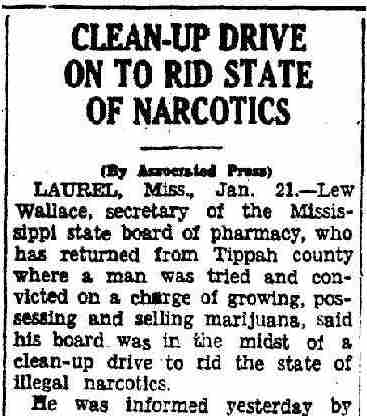
Which reads as follows:
HattiesburgAmerican1936-01-21p4Now the only problem with this article (which obviously makes reference to the Blue Mt. Incident), is that the newspaper page dates it as having been written on Jan 1936, whereas Mr. Jernigan was not even arrested until April of that year! Now, was Mr. Wallace a physic reader, or what?
“Clean-Up Drive on to Rid State of Narcotics”
Lew Wallace, secretary of the Mississippi state board of pharmacy, who has returned from Tippah county where a man was tried and convicted on a charge of growing possessing and selling marijuana, said his board was in the midst of a clean-up drive to rid the state of illegal narcotics. . . more . .
However, it appears that there is a real simple answer to this situation, and one that does not involve a conspiracy at all. Simply put the “Hattiesburg American Newspaper” placed the wrong date on some of its newspaper pages that day; -- Which was actually Jan 21, 1937 NOT 1936. This becomes quite clear as one looks at some of the other articles, articles that could NOT have been published in 1936 but at a later year, thus an honest mistake was made.
SECTION WARNING
For the most part what has been put up on this website has consisted mostly of opinions. Granted, they are opinions backed up by documentation, but still opinions never the less.
Was Mr. Jeanigan involved in some form of Reefer Madness Era conspiracy? We believe so, but beliefs are not good enough. A museum, by its very nature, must deal solely with absolutes and established facts, not opinions. And even then, mistakes are made; a good example being that psychic article dated Jan 1936. A smoking gun if ever there was one, yet in the end it now appears that some printer at the "Hattiesburg American" just put the wrong date up on top of the page. In other words, an honest mistake.
But be all that as it may, it is our hope (hint, donations are accepted) to one day be able to conduct a proper investigation into what really happened in Blue Mountain. But until then, we must leave it up to the reader to decide if Mr. Jernigan was indeed a BIG TIME DRUG LORD OR NOT.
Name: Henry Lewis - Location: - Clarksdale, Miss - Date: - Nov. 1935
Clarksdale, Miss.; Following the arrest of a man in this town in possession of five and one-half pounds of marihuana prepared for smoking a number of growing marihuana plants were found and destroyed. ---Oakland Tribune (Newspaper) Oct. 11, 1936 “Don't be a MuggleHead”NEWSPAPER ACCOUNTS:
MISSISSIPPI - Clarksdale On November 12, 1935, Henry Lewis, alias “Red”, a negro, was arrested at Clarksdale, Mississippi, in possession of 5 1/4 pounds of marihuana prepared for smoking. In his yard a number of growing marihuana plants were found and were destroyed. The defendant was sentenced to 60 days in the County Jail and fined $100.00. --- ILLICIT TRAFFIC IN MARIHUANA - aka Gore File
ClarksdaleRegister
[S]- 1935-11-15p1 - “Marajuana ‘Farm’ Stopped”
[Key-finder - Case#MS02]
MUSEUM COMMENT:
This case appears to be nothing more then a simple marihuana bust. How it got into Harry Anslinger’s Gore file (no axe murderers, no girls jumping out of fifth story windows) is beyond me.
WANT TO KNOW MORE:
=====================
Due to space / download time considerations, only selected materials are displayed. If you would like to obtain more information, feel free to contact the museum. All our material is available (at cost) on CD-Rom format.
CONTACT PAGE
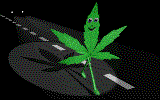 MAIN PAGE MUESUM OF REEFER MADNESS |